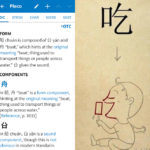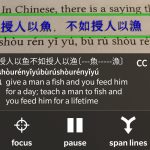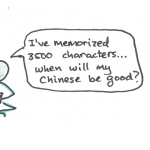Articles in the ‘Vocabulary’ category Page 7
-
When spaced repetition fails, and what to do about it
Spaced repetition software can boost your vocabulary learning significantly. The idea is to schedule each review as late as possible, but not so late that you forget the answer. This sounds good in principle, but when it comes to learning languages, just barely being able to come up with the right word is not enough!
Read → -
Dealing with Chinese characters you keep mixing up
The more Chinese characters you learn, the harder it becomes to keep similar characters distinct. If you’re not careful, a pair or group of characters can generate a lot of extra work and frustration. The solution is to trace your errors and figure out why you get the characters wrong and, then deal with them decisively!
Read → -
5 levels of understanding Chinese characters: Superficial forms to deep structure
How much do you need to care about the actual composition and meaning of a Chinese character when learning it? In general, better understanding means it’s easier to learn, but is there a limit to how closely you should stick to actual etymology? This article explores the spectrum from using superficial images to real etymology from the perspective of a language learner.
Read → -
Does using colour to represent Mandarin tones make them easier to learn?
Some learning materials, apps and tools allow you to add colours to show Mandarin tones, but is this really helpful? This article discusses the ins and outs of using colour to learn and remember tones, along with some practical considerations.
Read → -
How to look up Chinese characters you don’t know
Looking up an unknown character in Chinese is much trickier than looking up unknown words in most other languages. This article discusses various ways of looking up Chinese characters, including paper dictionaries, handwriting input, OCR and more.
Read → -
New course: Unlocking Chinese – The Ultimate Guide for Beginners
Do you want to make sure your Chinese learning gets off to a good start? Or have you already started, but feel a bit confused and need guidance? Then my new course, Unlocking Chinese: The Ultimate Guide for Beginners, is for you!
Read → -
The nine principles of learning (and the mistakes from failing to follow them)
In 2014, Scott Young spent 100 days learning Chinese, after which he was able to speak freely on a wide range of topics, as well as pass HSK 4. Since then, he’s continued exploring effective learning and has now published a book called Ultralearning. He hasn’t abandoned Chinese, though, and in this article, he discusses nine important principles for effective learning and how they relate to studying Chinese.
Read → -
101 questions and answers about how to learn Chinese
This is the biggest collections of questions and answer about how to learn Chinese anywhere. The questions are sorted into categories, and each question is answered briefly before links to further information is provided. If you have a question about how to learn Chinese, you’re very likely to find the answer here! If your question hasn’t been answered, please consider leaving a comment!
Read → -
The most common Chinese words, characters and components for language learners and teachers
A good principle for choosing what to learn is to focus on the most useful things first, but how do you know what’s most useful? Frequency lists can be helpful, but are often misused.
Read → -
7 things you were taught in Chinese class that are actually wrong
Some things your Chinese teacher tells you or you read in your textbook are well-meant simplifications. This is okay, because the whole picture might be overly complicated and not very helpful. Some other things your Chinese teacher tells you or you read in your textbook are just wrong, though. This article lists seven examples of things that are often taught in Chinese class, but are actually incorrect.
Read →









